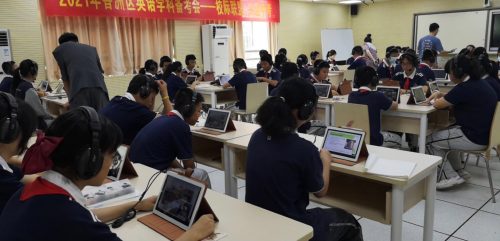


Given the time difference between Durham and Zhuhai, we’ve been teaching mainly at night so that our lessons can take place during the first periods of the day for our partner schools. University workloads often require work late into the night, but the fact that our main lessons are between 8pm and 10:30pm has required a lot of adjustment. At first it was pretty disorienting, especially given that the semester had just ended.
Equally disorienting was the fact that we had to learn how to teach relatively quickly, having to figure out which lesson plans are effective and fun and which are not. Teaching daily itself is a new skill, and I’m finding that creating a lesson plan that is engaging, informative, and challenging yet not overwhelming requires a level of thought and consideration that I might have previously taken for granted. Teaching this first week and interacting with our students, as well as having access to the students’ English language textbooks, has made the process of lesson planning more approachable. Handing technical problems complicates teaching too though. Even with a good lesson plan, poor internet connections and my spotty computer audio create an extra barrier that need to be accounted for.
These challenges and adjustments are unavoidable. Earlier in the week I was having a hard time coping with the adjustments. Moreover, I was worried about the actual impact of my work. Given that this program is totally virtual as opposed to being in person, I’ve been fearing that our teaching will be by default less impactful than in previous years.
This feeling, I’ve realized, comes more from the fact that it’s more difficult to witness growth, reaction, and progress in others through windows on a screen. The group conversations and reflections we’ve held have helped me come to terms with the conditions of this summer’s program. They’ve also helped me recognize the specific ways in which our conversational English lessons can be helpful to students. Knowing that our seventh graders are facing rigorous exams (featuring English as a main subject) in only a few years puts into perspective the stake of our teaching. Moreover, the practice of overcoming its many difficulties of language learning can create quite a lot of confidence in a person. Just in this week’s classes, I’ve watched students become more outspoken and energetic as we’ve interacted and played games. As the challenges of this new format are resolved, and as our teaching plans improve, I’m sure the students will continue to engage and participate and improve their ability to speak English. At the same time, I hope this improvement brings with it the thrill and happiness of learning.
